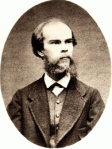
Louise Howlett and Albert Combrink
Louise Howlett and I will be performing “Moonlight Serenade” in Kirstenbosch’s Chamber Music Breakfast Concert series on Sunday 19 July 2009, 11 a.m. with Breakfast served from 9.30 a.m.
The programme features various songs inspired by the night, including two songs by Gabriel Fauré: “Après un rêve” and “Mandoline”.
“Mandoline” is a Verlaine setting in which the singer views a party from some distance; wry comments about the attendees are followed by a rhapsodic description of their elegance as they seem to dissolve in the moonlit air. Debussy set it as well, changing the musical material with the mood of the poem, but Fauré does not develop thematically—a quiet, jaunty figure in the piano conjures the title instrument, and a returning rising scale between stanzas directs our view from detail to detail. A contrasting section introduces some whirling arpeggios and delightful dotted rhythms in the voice, to illustrate the turn of the dance. Fauré chooses just the right key: the mandolin starts to play in the bright key of G major. At the first scene change, the rising scale is suddenly in F#, all the black keys coming into play—”a sudden bit of legerdemain that perfectly captures the swoon of disorientation in the dim light, not to mention the whole affair’s hushed choreography as perceived from without”. (Description courtesy of Matthew)

Mandolin Player: Giovanni Tiepolo (1696-1770)
Les donneurs de sérénades – Poem by Symbolist poet Paul Verlaine (1844-1896), set in 1892 as “Mandoline” by Gabriel Fauré (1845-1924):
Les donneurs de sérénades
Et les belles écouteuses
Echangent des propos fades
Sous les ramures chanteuses.
C’est Tircis et c’est Aminte,
Et c’est l’éternel Clitandre,
Et c’est Damis qui pour mainte
Cruelle [fait]1 maint vers tendre.
Leurs courtes vestes de soie,
Leurs longues robes à queues,
Leur élégance, leur joie
Et leurs molles ombres bleues,
Tourbillonent dans l’extase
D’une lune rose et grise,
Et la mandoline jase
Parmi les frissons de brise.

Serenader - Antoine Watteau (1684-1721)
English Translation by Emily Ezust
“The givers of serenades”
The givers of serenades
And the lovely women who listen
Exchange insipid words
Under the singing branches.
There is Thyrsis and Amyntas
And there’s the eternal Clytander,
And there’s Damis who, for many a
Heartless woman, wrote many a tender verse.
Their short silk coats,
Their long dresses with trains,
Their elegance, their joy
And their soft blue shadows,
Whirl around in the ecstasy
Of a pink and grey moon,
And the mandolin prattles
Among the shivers from the breeze.
In poetry, the symbolist procedure – as typified by Verlaine – was to use subtle suggestion instead of precise statement and to evoke moods and feelings through the magic of words and repeated sounds and the cadence of verse (musicality) and metrical innovation. (Marie Rolf). While Debussy is more redily identified as a “Symbolist” composer, this work by Fauré resonds to the “magic of words and repeated sounds” with the magic of mandolin-like repeated strumming sounds, creating a gently bouncing accompaniment for the text. Here is a recording of a Mandolin, playing a sweet little french song by Georges Villard “La Petite Tonkinoise” , made famous in this charming 1953 version by the delightful Joséphine Baker.
Below are some recordings of “Mandoline”
A very beautiful and unusial version of “Mandoline” by counter-tenor Philippe Jaroussky and pianist Jerome Ducros, sung in a vocal coaching session with singing teacher Nicole Fallien.
Joyce Di Donato and Julius Drake give a stylish and elegant performance.
A surprisingly charming performance by Armenian mezzo-soprano Zara Dolukhanova, who uses her colloratura mezzo voice to tremendous effect.
This poem has been set to music by a number of composers including: Claude Debussy, Reynaldo Hahn, Gabriel Grovlez, Josef Szulc and Gabriel Dupont, amongst others.
A different setting of “Mandoline” by composer Gabriel Dupont, sung by Philippe Jaroussky.

French Poet Paul Verlaine
More about the poet:
French poet and leader of the Symbolist movement in poetry. Paul Verlaine’s life style wavered between criminality and naive innocence; he married a young girl in 1870 but after a year fell in love with the young poet Arthur Rimbaud, who was seventeen. With Stéphane Mallarmé and Charles Baudelaire he formed the so-called Decadents. In Verlaine’s works two impressions predominate: that only self is important, and that the function of poetry is to preserve moments of extreme sensation and unique impressions. In spite of the ‘vagueness’ of his poetry, Verlaine showed a careful craftsmanship in his compositions, using simple, musical language. He maintained the outward form of classical poetry, but his work opened the way for free verse. The Symbolists would often share themes that parallel Schopenhauer’s aesthetics and notions of will, fatality and unconscious forces, and used themes of sex (such as prostitutes), the city, irrational phenomena (delirium, dreams, narcotics, alcohol), and sometimes a vaguely medieval or Classic setting.
I enjoy performing this song. It has a sweet, innocent charm that is hard to resist. Louise’s response to the text is very alive and tells a tiny little story, like a quick snapshot of a painting, or a world that no longer exists. It does, however, make us feel like “donneurs de sérénades”. And that is pure pleasure!

Gabriel Fauré

Leave A Comment
You must be logged in to post a comment.